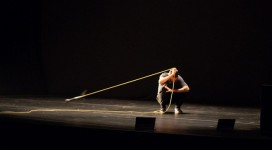blog_ 7x7
ALEJANDRO AHMED X WAGNER SCHWARTZ = no title yet.
By Wagner Schwartz, around About Expectations and Promisses (Sobre Expectativas e Promessas), by Grupo Cena 11 Cia. de Dança.
Yesterday I saw a transparent play about the universe of things. They had one body and two names. Between one and the other there were thousands of signs of coming and going, of departure and arrival etc. I had to leave a continent to write about them and when I landed I noticed they weren’t there. They had stayed between two worlds. In the middle of the Atlantic Ocean.
About Expectations and Promisses has somewhat permissive, melancholic. It doesn’t separate ways because the sea has already been parted once in the story and once in the thought. Leave the future to the end, it doesn’t care. I speak of a play constituted of two people, actually, a fox and a deer. Both have distinct qualities, but we can’t judge what’s on stage, it’d be embarrassing. They learned to be as they are. Their almost savage universes may be seen only from a distance.
From where I stand, I see the deer amplify a certain noise to accompany the fox. The fox manifests itself. It seems to be alone. It takes vengeance on whoever imagines there is no presence there, while it incorporates signals in front of and on both sides of those who observe it. It folds them, throws them away, abandons them, equalizing its way to move with its thought. It experiments with many things that cannot be described, only seen.
The deer is out of sight. In the end of the days, their relation is relative. Some people could call them Lead and Support; others may say Major and Minor – these forms of naming characters in the world vary according to seasonal preferences. As I am the narrator of this report, I prefer to differentiate them as Fox and Deer because, no one can deny, they were made to each other and both do exist.
The Deer lets out a yell for the Fox to deal with it. The fox gets desperate, angry, finds what makes sense in its body and throws it out. The Deer amplifies the Fox’s sound activity, for the power of what’s coming out is unintelligible. After everything that was done, it’s impossible to say: I didn’t hear it (not to understand may be a seasonal option too). Full of stories that are born spontaneously, the Fox gets hold of the thing that amplifies it and throws it to-and-fro saying: “this thing here is mine and nobody else’s (but this is what I understood). The Deer is not surprised, it seems used to the sentimental fits of its friend.
While the notion of time is being built, there is a light operating in this place. It is complex, maybe prolific. It hits space with no projection, it wasn’t designed to illuminate the universe of things, like when it is night and we need to light one or two candles to approach a certain subject. Light in nature visits its holes and sometimes lights them. (I look to the side and see that the Fox still insists on talking and talking out of the scope, but without opening its mouth now.)
At last, I see a suspended object indicating the sound frequency of each movement. Those bound to it may come to believe in the fertility of the encounter between what is thought and what the other is thinking; but the thing, for being too illuminated and certain of its commitment with the world, leaves traces of a great enigma, if what was seen was the revelation of a secret or if what happened could relieve the act of thinking.
For hunting to feed only one animal, foxes are lonely predators and not gregarious.
Wagner Schwartz Works with contemporary art, dance and literature between São Paulo and Paris. His projects problematize the artistic relations and their course.
Translation Portuguese-English: writer and poet Chris Ritchie, M.A.

